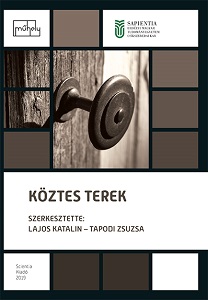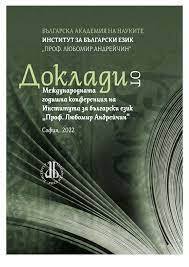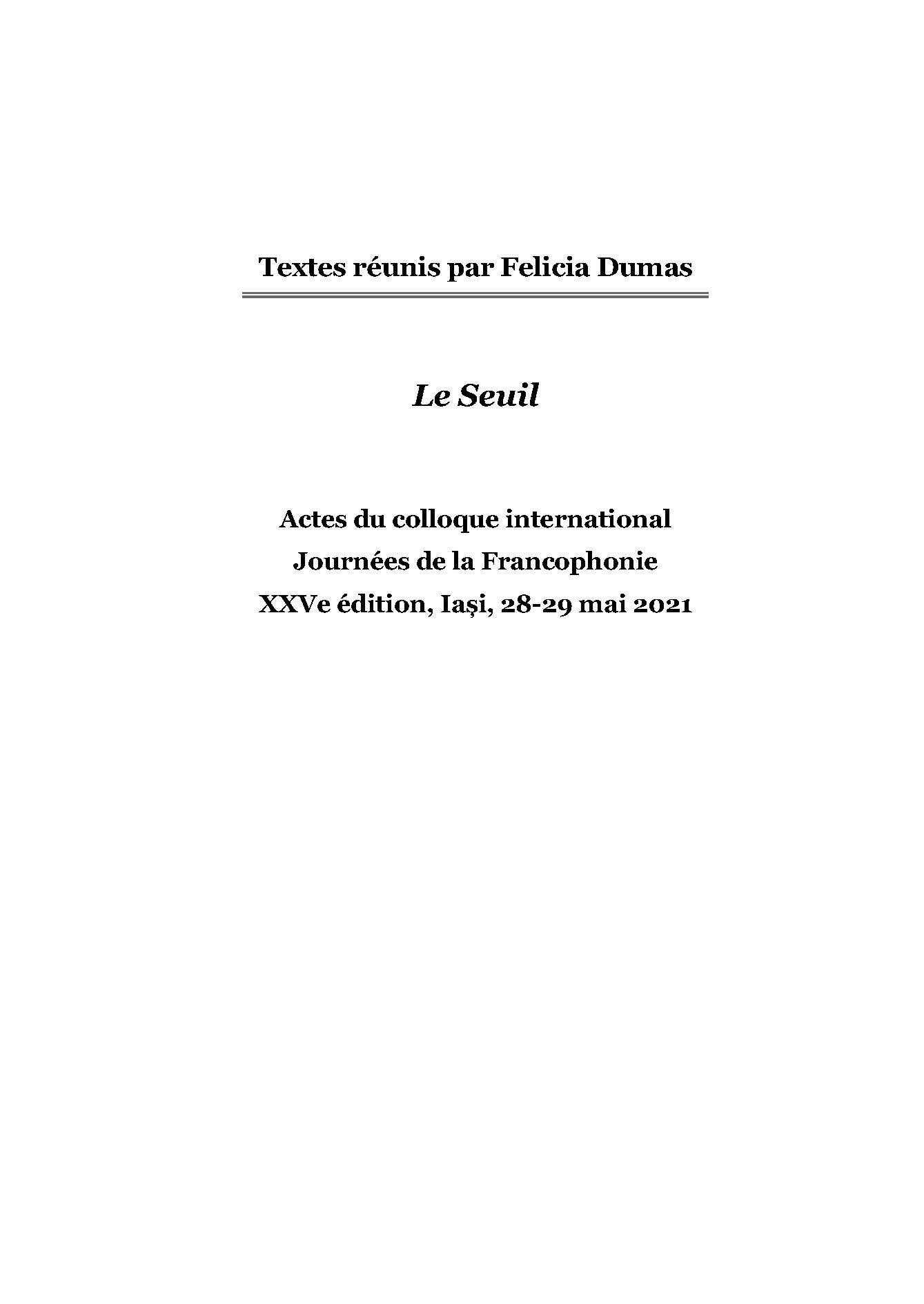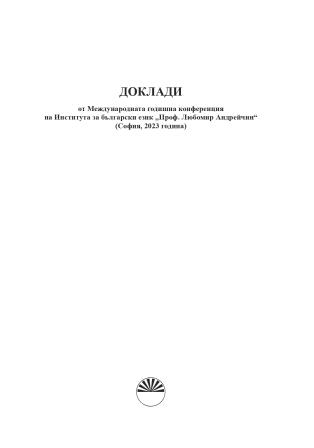
We kindly inform you that, as long as the subject affiliation of our 300.000+ articles is in progress, you might get unsufficient or no results on your third level or second level search. In this case, please broaden your search criteria.




As a bright marker of the author’s idiolect, the оccasionalisms in the rhythmic and narrative works of Stoyan Mihaylovski are original and colourful verbal representations of the author’s insights, emotions and sociopolitical assessments. In the present study 32 hapax legomena and rare words have been lemmatized and analyzed in alphabetical order – from letter N to letter Yа. They have been excerpted from several Stoyan Mihaylovski’s works. Тhese lexemes have been compared with more than 40 Old Bulgarian, Middle Bulgarian and Modern Bulgarian and Russian texts (originated in the XI–XX century) to highlight their originality. Criteria for this analysis are: morphemic structure, denotative and connotative semantics, word formative ways, stylistic scope of use, their synonym corelats and the diffusion of occasionalisms in the Modern Bulgarian language.
More...
In the text I report on documents from the personal archive of the writer Hristo Gerchev, stored in the State Archives - Shumen, related to the history of the Bulgarian literary language. The most important of them is the letter I read from 1910 from Prof. Benyo Tsonev to his student Hristo Gerchev.
More...
The article presents the names pop / papa / papas of Christian religious persons included in the anthroponymy of the Christian population of Nevrokopska Kaza, according to data from Ottoman tax registers from the 16th century. A comparison is made with material from Ottoman registers for Western Thrace and the Southern Rhodopes. A name of domestic, Bulgarian origin, pop is the most widespread in the lists of the Nevrokop region.
More...
The fragment of the linguistic picture of the world, revealing the physical and mental status of the Bulgarians, is widely presented in the lexical and phraseological fund of the Bulgarian language. The aim of the article is to analize the representation of the concept of health in the Bulgarian language and some of the linguistic and cultural dimensions of health related to the traditions and practical experience of native speakers of the Bulgarian language. The material used in the research was excerpted from dictionaries, collections of proverbs and sayings, archives and conducted associative questionnaires.
More...
The publication discusses the updating of linguistic issues. This research process comes down to a change in the approaches and methods of analysis of linguistic facts. Sometimes this leads to the denial of authoritative theories and the emergence of new schools and directions of linguistic thought. The updating of linguistic issues is a necessary condition for the development of linguistics and its gradual convergence with other human sciences.
More...
This is an attempt to explain the eternal problem of body and soul and its substance, beginning and destructive end of the writing sign – and way to understand the personal strategies to explain the scientific rools. As remark of Derrida’s „L’Аutre cap“ (1991), „Apрorien“ (1998), „Apocalypse“ (1985), „L’ecriture et difference“ (2007) and „Grammatologie“ (1967), the author offers his thesis on Type and Similarity as personal choice as selfanalytic discourse. He makes a step on penetrating once again into the sense and reasons for the Tуpe, especialy for the Glagolitic beginning and Cyrillic continuation. Bringing an observation, V. Rainov for the first time sets to work in a complete general linguistic – psychological, neuropsychological and philosophical knowledge about human language in the Neolinguistic paradigm.
More...
The aim of the paper is to make a comparative analysis of the number of the defective nouns singularia tantum in both Slavic languages – Bulgarian and Slovak, to trace and establish parallels, but also inconsistencies in this language area and to draw conclusions.
More...
The article presents a comparative analysis of the speech genre of political discourse – the president’s New Year’s address to the people. New Year’s address is characterized as a ritual genre and is considered in the linguopragmatic aspect. The features of the ritual political discourse reflected in the speech genre of the New Year’s address are studied. A typology of communication strategies relevant to the presidential discourse in the New Year’s address is proposed. The linguistic features of the implementation of strategies and tactics of the communicative interaction of the president with the people in the New Year’s address are indicated. The New Year’s speeches of the presidents of Bulgaria, Slovakia, Poland, Ukraine and Russia presented on New Year’s Eve 2022 are analyzed.
More...
The paper presents BulFrame – a web-based system designed for creating, editing, evaluating and viewing conceptual frames. A unified theoretical model for the formal presentation of conceptual frames has been developed, which predetermines the architecture of the application for data processing. The conceptual frame defines a unique set of syntagmatic relations between verb synonymous sets representing the frame and synonymous sets of nouns expressing the frame elements. In this way, the structure of the conceptual frame combines and builds on the semantic knowledge presented in WordNet and FrameNet.
More...
Like the myths, the tales challenge our spirit and a worldview historically based on materialism, on the philosophy of the excluded third, on linear temporality and on submission to the laws of causality. The fairy tales, and this Romanian one in particular - Youth Without Age and Life Without Death -, offer us a way out of our customary reductionism, allowing a holistic and metaphysical approach in the broadest sense. What makes the originality, if not the uniqueness, of this tale is that we are dealing with a triple threshold, or rather with three thresholds.
More...
Written in French and Romanian, Vintilă Horia’s autobiographical work dedicates an important amount of space to the recounting of dreams: memorable nocturnal dreams, as well as poignant daytime reveries of the self that tells of itself are transcribed, often commented upon and interpreted. The writer pays extreme attention to signs, that is to say, in baudelairian terms, to the forest of symbols he traverses. On the other hand, the experience of exile and wandering, so painful to the author, have elevated the Home Country, in his view, to the status of an absolute, mythical and heavenly place, and thus have created inside his subconscious a parallel geography of the world. However, sometimes, this particular type of experience, which is situated on the plane of the “imaginal world” (Henri Corbin), increases in intensity with lightning speed: a certain oneirical threshold is crossed without warning; and then we readers find ourselves, in the company of the subject expressing himself but also through him, immersed in the midst of a visionary space. These are some of the most important aspects that we aim to briefly analyse in this paper, browsing through a remarkable autobiographical body of texts, comprising some 1500 pages, that this great exile and Goncourt winner (1960) has left behind.
More...
Usually, two cultures hold the reigns in Andreï Makine’s novels – the Russian matrix and the French catalyst. However, the novel “Une femme aimée” has a slightly different structure, because the Russian catalyst overpowers any other culture. Every time Oleg Erdmann turns a pocket mirror over and over in his hand, he thinks about the hidden alcove of the Empress Catherine the Great – a big, heavy threshold, made of glass, that falls and rises over the years. Meanwhile, Russia, as he knows it, changes and then ceases to exist. On the verge of this new world, the financial censorship tears the humanity apart even more than the pollical one did.
More...
Paradoxes and strong contrasts have always been one of the most common ideas of the Baroque movement. However, what seems unusual is the permanent oscillation between life and death, but also the mixture between the illusory and the real. Thereby, eloquent examples could be represented by two of the authors devoted to the literature of the time. As for the two texts belonging to Pierre Corneille and Pedro Calderón de la Barca, the motif of illusion and the theme of dream are, of course, aspects that bring these pieces together. We will see how their playwrights reflect the threshold between the life and dreams of their characters, in “L’Illusion comique and”: “La vida es sueño”.
More...
The concept of “threshold” is closely linked with the development of foreign language teaching. Most often, the word “threshold” is encountered in the phrase “level-threshold” and has become in recent years one of the key concepts in language teaching and the CEFR. The usefulness of the threshold level (threshold levels) is justified by its use in the development of different textbooks and language methods, curricula, certifications, assessment tests and for teachers. The origin of the term is associated with the mid-1970s with the Threshold Level, which represents the first functional / notional specification of language needs of the Council of Europe.
More...
We aim to discuss in this article about the link between translation and linguistic stasis, more precisely for the Christian orthodox translations from French into Romanian. This type of linguistic stasis is present mainly in Romanian culture unlike other francophone western cultures. Therefore, the translator anxious to integrate into a tradition of translations of this kind is obliged to respect the lexical and cultural constraints of the language of arrival.
More...
The French poet Paul Verlaine belongs to classicism from the point of view of poetic form and to modernity from the point of view of semantic content. His poems question the created artistic universe, just as modern poetry does. His lines are noticed by order, rigor and symmetry. The poets Dimitrie Anghel and Șt. O. Iosif tried to translate them in such a way that their variant has on the Romanian reader the same effect as the original on the French reader.
More...
The article examines survey material relating to the concept of SOUL. Survey data obtained on the basis of questions with open and closed answers, as well as questions based on the associative principle, were analyzed. Denotations are brought out, new metaphors are identified, with which the concept lives in the consciousness of the modern Bulgarian. Comparisons are made with the proverbial concept SOUL, on the basis of which the studied concept is assigned to the group of the developing concepts.
More...